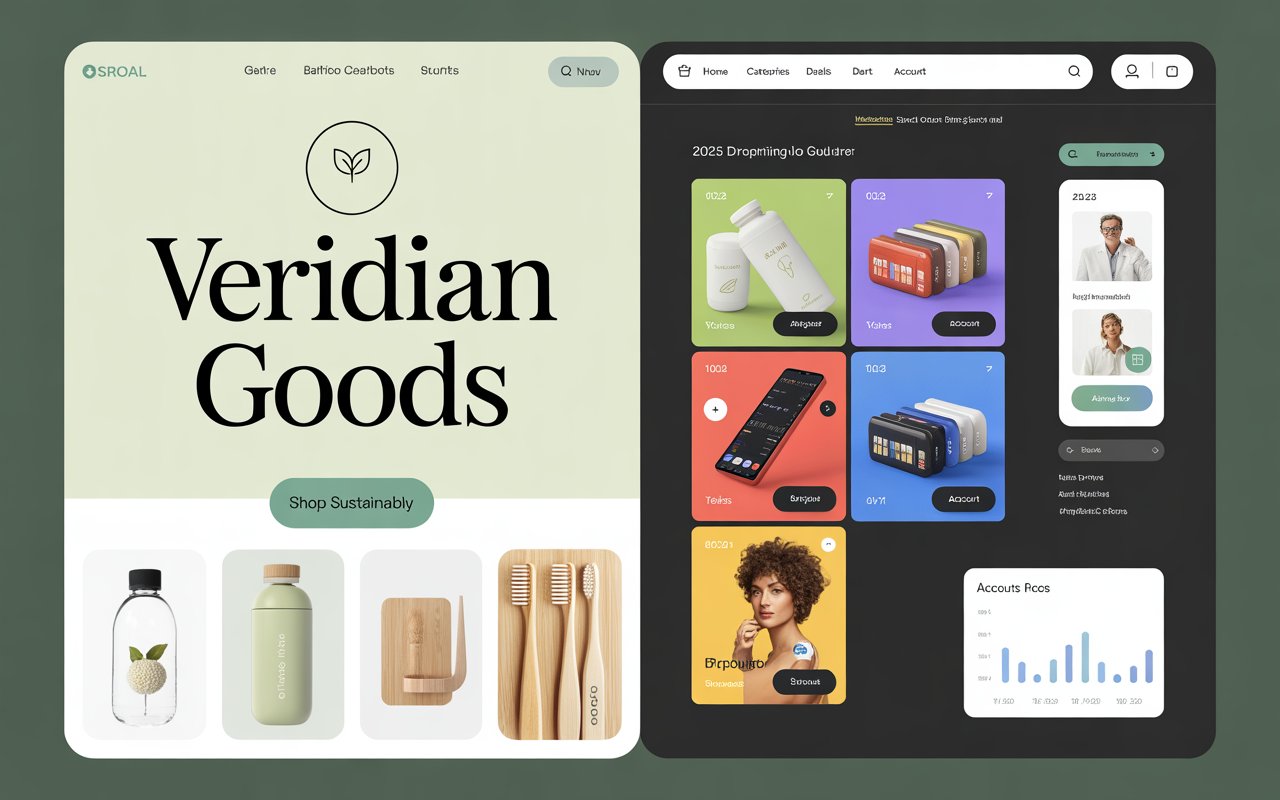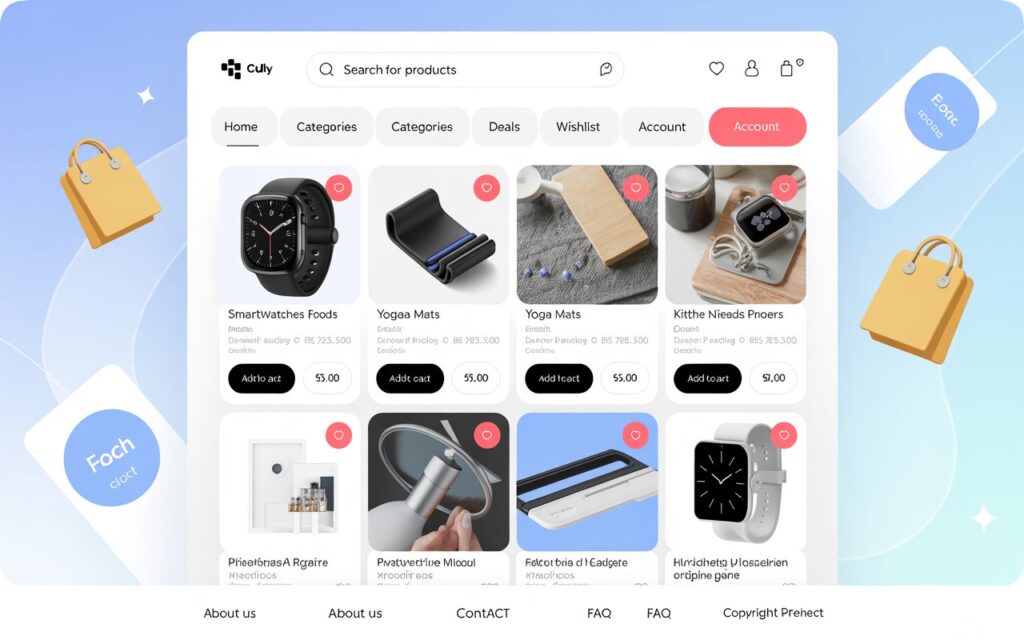The dropshipping industry has evolved dramatically over the years, and 2025 is poised to be its most competitive year yet. As more entrepreneurs enter the market, choosing the right store model becomes a make-or-break decision. Should you go for a focused niche store or cast a wider net with a general store? Let’s dive deep into this pivotal choice.
A niche store targets a specific category or customer interest—think pet accessories, eco-friendly products, or outdoor gear. In contrast, a general store sells a broad range of items across unrelated categories, much like an online version of Walmart or Target.
Your store’s structure will significantly impact your marketing strategy, branding, customer retention, and profit margins. In this article, we’ll compare the two models head-to-head to help you build a store that’s optimized for success in 2025.
Pros and Cons of a Niche Dropshipping Store
Benefits of Focusing on a Niche
-
Stronger Brand Identity: When your store is centered around a specific interest, it’s easier to build a loyal audience. Visitors instantly know what you stand for.
-
Lower Marketing Costs: With well-defined customer personas, ad targeting becomes more precise and affordable.
-
Improved SEO Potential: Targeting long-tail keywords specific to your niche enhances organic traffic and authority.
-
Higher Conversion Rates: Customers are more likely to trust and buy from a store that’s clearly passionate about one product category.
Common Pitfalls in a Niche Store
-
Limited Product Range: Once you exhaust your category, expansion can be tough without confusing your brand.
-
Market Saturation: Popular niches can become overcrowded, leading to fierce competition and reduced margins.
-
Scaling Constraints: Growth can plateau if your niche lacks breadth or trending potential.
Examples of Profitable Niche Markets
| Niche Market | Description | Product Examples |
|---|---|---|
| Eco-Friendly Products | Focus on sustainability | Reusable straws, bamboo toothbrushes |
| Pet Lovers | Target dog or cat owners | Pet toys, grooming kits |
| Fitness Enthusiasts | Home workout gear | Resistance bands, yoga mats |
Pros and Cons of a General Dropshipping Store
Flexibility and Scalability
A general store gives you the flexibility to test multiple products without being confined to one niche. This is great for discovering trending items and pivoting quickly. You can ride product waves—like fidget spinners or smart watches—without disrupting your brand image.
Challenges in Branding and Marketing
-
Weaker Brand Loyalty: Shoppers may not see your store as a destination for a particular need, reducing repeat purchases.
-
Ad Fatigue: It’s harder to tailor messaging when you’re advertising vastly different products.
-
SEO Complexity: General keywords are more competitive, and your site may lack topic authority.
Successful General Store Examples
-
Wish – Massive catalog with constantly changing inventory.
-
AliExpress-based dropshipping stores – Some use a general format to experiment with viral products.
Market Trends in 2025
Consumer Behavior Changes
Consumers are smarter, more selective, and demand transparency. Reviews, fast shipping, and quality matter more than ever.
The Rise of Micro-Niches
2025 is seeing explosive growth in micro-niches—tiny segments of larger markets. For example, instead of just “home fitness,” think “fitness gear for seniors.”
AI and Automation in Dropshipping
AI tools are streamlining everything—from customer service chatbots to automated product research. Niche stores are using AI to personalize customer experiences, while general stores use it for broader inventory management.
![]()
Target Audience Considerations
Audience Matching with Niche Stores
Niche stores win when they speak directly to a well-defined group. You can cultivate a community, leverage user-generated content, and build strong customer loyalty.
Broader Appeal of General Stores
General stores attract impulse buyers looking for variety or deals. While loyalty may be low, high volume can offset that.
Store Branding and Identity
Creating Strong Brand Stories
A niche store can craft a compelling narrative. Whether you’re “pet lovers saving the planet” or “gear for outdoor explorers,” the story strengthens trust.
Product Selection and Consistency
Consistency is key. Niche stores should ensure every product fits their theme. General stores need to organize inventory to avoid looking chaotic.
Visual and Verbal Branding for Both Models
| Branding Element | Niche Store | General Store |
|---|---|---|
| Logo & Colors | Thematic and consistent | Neutral and versatile |
| Voice | Passionate and specific | Friendly and broad |
| Layout | Focused and story-driven | Category-based |
Marketing Strategies Comparison
Social Media & Influencer Marketing for Niche Stores
Influencer marketing is especially effective for niche stores. Micro-influencers can generate high engagement within specific communities.
Paid Ads Strategy for General Stores
General stores often rely on Facebook and TikTok ads to test product-market fit quickly. Viral products perform best in this format.
Email Marketing and Retargeting Tactics
Both store types benefit from email marketing. However, niche stores tend to have higher open and conversion rates due to relevance and engagement.
SEO and Content Marketing Differences
Niche SEO Strategies
-
Focus on long-tail keywords
-
Create topic clusters and educational blogs
-
Leverage YouTube and Pinterest for visual content
Challenges in SEO for General Stores
-
Lack of topical authority
-
Difficulty in ranking without product-specific blogs
-
Thin content across many unrelated pages
Product Sourcing and Testing
Finding Suppliers for Niche Stores
Platforms like Spocket and CJ Dropshipping offer specialized products with faster shipping times.
Broad Product Testing in General Stores
Apps like DropshipRabbit or Sell The Trend help general stores test dozens of products monthly.
Tools and Apps to Use in 2025
-
Zendrop: Fulfillment automation
-
Loox: Photo reviews for trust
-
ChatGPT plugins: Smart product descriptions
Conversion Rate Optimization (CRO)
Personalization in Niche Stores
One of the biggest strengths of niche stores is the ability to deeply personalize the shopping experience. Here’s how they do it:
-
Personalized Product Recommendations: Based on browsing history or quiz results.
-
Landing Pages for Specific Audiences: For example, “Yoga Mats for Busy Moms.”
-
Customer Testimonials from the Niche Audience: Builds emotional trust and social proof.
This focused personalization can double or even triple your conversion rates because customers feel understood.
Product Page Optimization in General Stores
While general stores lack niche personalization, they can still boost conversions by:
-
Highlighting Urgency: “Limited stock!” or “Hot trending product!”
-
Split-Testing Product Titles: Testing what triggers the most clicks and purchases.
-
Optimizing Layouts for Mobile: Most impulse buys come from mobile users.
Both models should continuously A/B test headlines, CTAs, and images to refine their conversion strategies.
Customer Loyalty and Retention
Building a Community for Niche Shoppers
A niche store can create a tribe of passionate fans. Tools and tactics include:
-
Private Facebook Groups
-
Email newsletters with expert tips
-
Referral programs specifically targeting niche needs
The result? Higher Customer Lifetime Value (CLV) and more User-Generated Content (UGC).
Maximizing Lifetime Value in General Stores
General stores, while having lower brand loyalty, can still retain customers by:
-
Offering discounts on repeat purchases
-
Creating a VIP program for top buyers
-
Using automated follow-ups after purchases
The key here is convenience, fast shipping, and competitive pricing.
Scaling Your Dropshipping Business
When and How to Expand
Whether niche or general, scaling happens when you’ve validated your product-market fit. Here’s how:
-
Niche Stores: Scale with complementary products and subscription boxes.
-
General Stores: Scale by adding winning products and building segmented email lists.
Cross-Selling and Upselling Tips
-
Niche Example: Selling yoga blocks with yoga mats.
-
General Example: Recommending Bluetooth headphones when someone buys a phone case.
Use apps like Zipify OCU or ReConvert for automated post-purchase offers.
Case Studies: Success Stories in 2025
Niche Store Case Study: EcoGlow
-
Niche: Sustainable home products
-
Success Strategy: Instagram micro-influencers, UGC contests
-
Results: $40K/month revenue with 25% repeat customer rate
General Store Case Study: TrendPalace
-
Model: Viral product testing store
-
Success Strategy: TikTok ads + rapid A/B testing
-
Results: 5 winning products scaled to $100K/month within 6 months
Common Mistakes to Avoid
Niche Store Blunders
-
Going too narrow (e.g., “gluten-free dog treats for seniors”)
-
Neglecting market demand and trends
-
Ignoring customer feedback for expansion opportunities
General Store Errors
-
Selling completely unrelated products (e.g., baby bottles and car tires)
-
Poor site organization
-
Underestimating customer support needs
Avoid these pitfalls to set your store up for long-term success.
Tools and Platforms for Success in 2025
| Category | Tool/Platform | Best For |
|---|---|---|
| Store Builder | Shopify | Easy to use, scalable |
| Product Research | Minea, Sell The Trend | Viral product discovery |
| Email Marketing | Klaviyo | Segmentation and automation |
| Reviews | Loox, Judge.me | Trust-building |
| Analytics | Triple Whale | E-commerce insights |
These tools empower both niche and general stores to operate like well-oiled machines.
Final Verdict: Which Model Should You Choose?
Key Takeaways
| Criteria | Niche Store | General Store |
|---|---|---|
| Branding | Strong, focused | Generic, weak |
| Marketing | Targeted, cost-effective | Broad, expensive |
| Product Range | Limited but aligned | Unlimited |
| SEO | Easier, more authority | Harder, fragmented |
| Risk | Lower long-term | Higher but flexible |
Decision Matrix for Choosing the Right Model
| Factor | Ideal Model |
|---|---|
| You have deep knowledge of a hobby or industry | Niche |
| You enjoy testing and selling trending items | General |
| You want to build a long-term brand | Niche |
| You’re focused on quick profits | General |
Ultimately, your success lies in understanding your strengths, goals, and how much effort you’re willing to invest in branding vs. product testing.
FAQs About Niche vs General Dropshipping Stores
1. Which store type is easier to start for beginners?
A general store is typically easier for testing products quickly, but a niche store may be easier to manage long-term.
2. Can I start with a general store and then niche down?
Yes! Many successful sellers test products in a general store and then transition to a niche store around their best-seller.
3. What niches are trending in 2025?
Sustainable products, remote work tools, mental wellness, pet accessories, and AI-powered gadgets.
4. Are niche stores more profitable?
They can be, especially if you build a loyal audience. However, success depends on execution.
5. Do I need different marketing tools for each model?
The core tools are the same, but how you use them—targeting, segmentation, and creative—differs greatly.
6. Which model is better for brand building?
Niche stores win hands down when it comes to building a strong, lasting brand.
Conclusion
In the battle of Niche vs General Store, there’s no one-size-fits-all answer. Each model comes with its own set of benefits, risks, and strategic requirements. If you’re looking to build a meaningful brand and loyal audience, a niche store is your best bet. If you’re drawn to trend-hopping, fast testing, and high scalability, a general store might be the way to go.
Take time to assess your goals, budget, and market knowledge before diving in. Remember, the most successful dropshippers in 2025 are the ones who stay agile, use the right tools, and keep their customers at the heart of everything they do.



